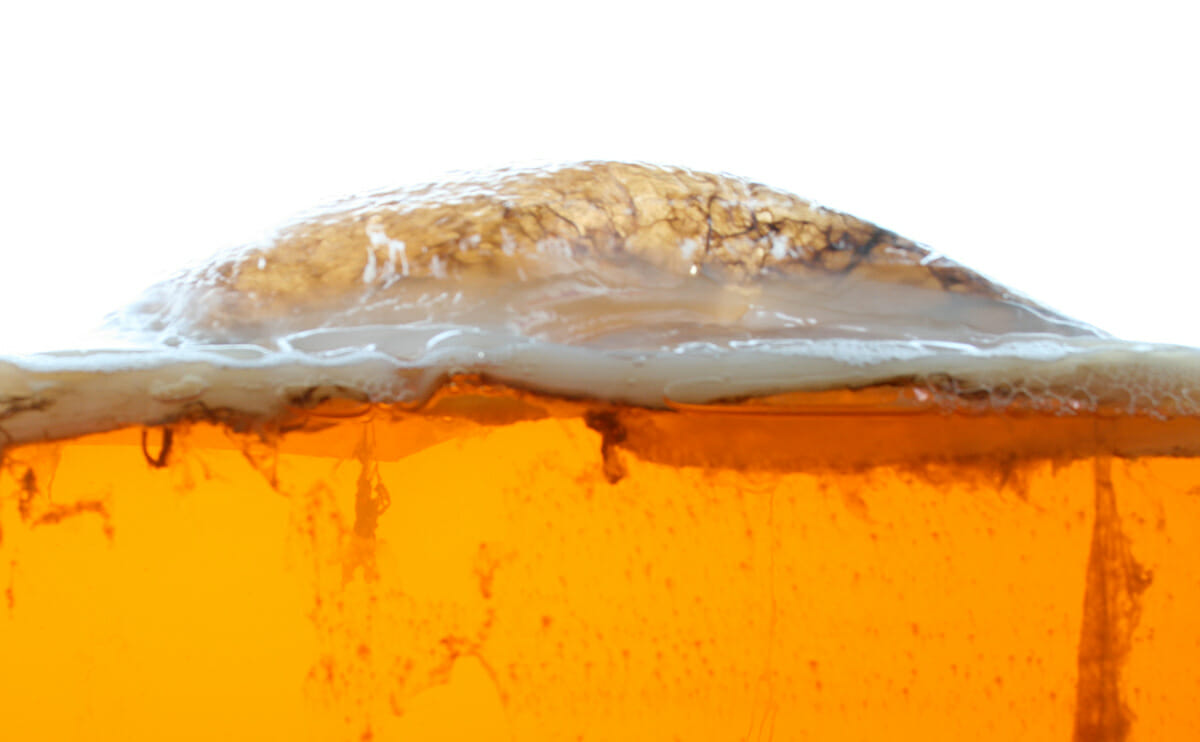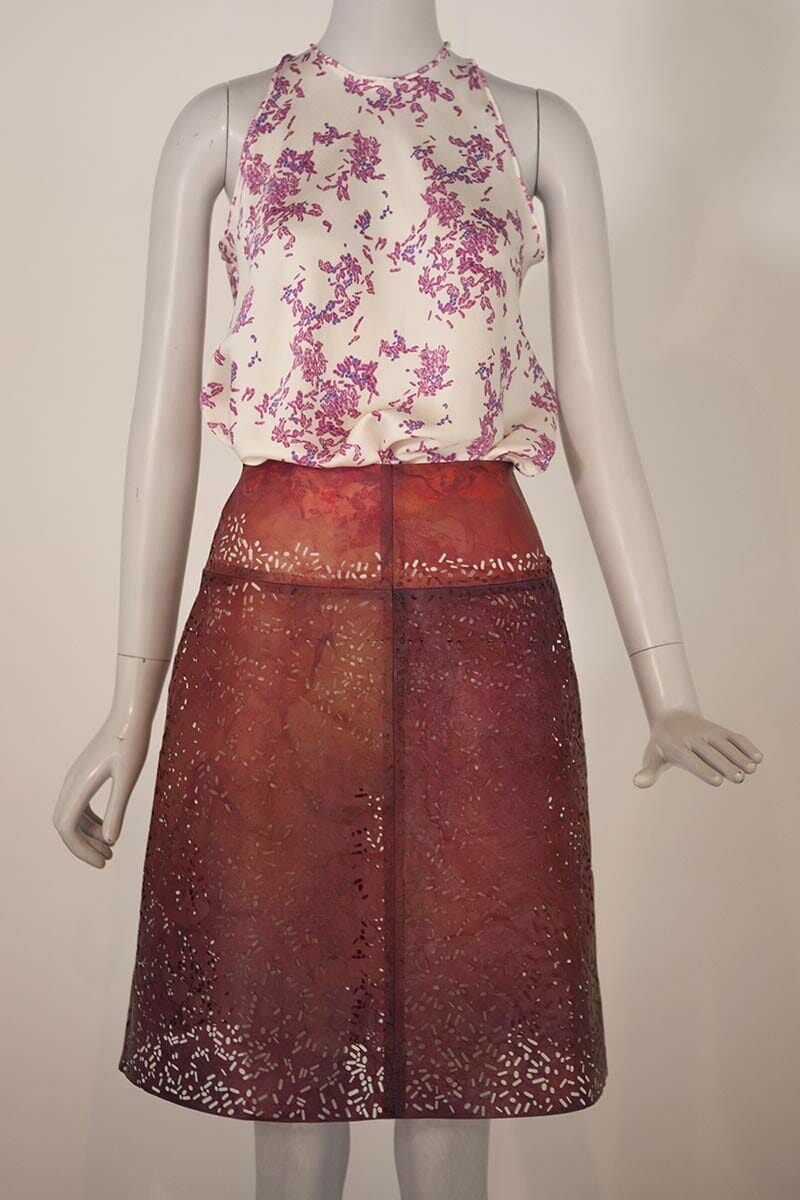Organic Fashion: Inside the Lab That Grows Clothing
Can’t find those perfect summer shoes in stores? Try brewing your own pair at home.
Organic Fashion: Inside the Lab That Grows Clothing
Can’t find those perfect summer shoes in stores? Try brewing your own pair at home.

Lee, the founder of Biocouture, a living material design consultancy based in the United Kingdom, has developed a method to grow her own organic material from little more than ingredients found in any standard kitchen. (If you fancy growing yourself a jacket or a new pair of heels, check out the recipe here.) The material is grown using a similar method to how you brew renowned folklore fix-it-all kombucha and when dried (think fruit leather) it can be formed and sewn into shirts, dresses, jackets and even shoes. It’s even compostable, so if you wanted to you could toss it in with the rest of your food scraps when you were done wearing it.
Not that you’d want to throw away one of Lee’s pieces. Taking cues from her work in fashion while studying at Central Saint Martins School of Art, she’s used the material to produce several beautiful one-off designs (one of which she can be seen modeling during her 2011 TED talk) that highlight the possibilities the material has as a realistic alternative to current fabrics.

So just how does fermented tea turn into a material that can be used to make clothing?
Well according to Biocouture’s website the relationship between the sugar and yeast creates thread-like fibers called nanocellulose. As with standard kombucha, while the mixture ferments a slimy mass of bacteria slowly forms across the surface. Kombucha brewers sometimes call this the mushroom, or mother, and it can be removed and saved to start another brew. In Lee’s process this fibrous blob, known as a SCOBY (Symbiotic Colony of Bacteria and Yeast), is removed from the tea mixture and dried on a sheet of wood. As the water evaporates from the material the remaining leathery skin can be stretched over molds or cut into traditional fabric patterns.

Lee’s fermented fashions are strictly prototypes, and will not be available for purchase. The aim of the project is to showcase living materials and provide a glimpse into a decidedly more organic world of manufacturing.
“I’m really excited about how we can think about organisms like microbes as the factories of the future,” Lee told Dezeen, a popular online architecture blog. If you’re ever considering making up a jug of homemade kombucha, why not try brewing up a new summer dress or a custom pair of sandals while your at it?
Follow us

This work is licensed under a Creative Commons Attribution-NoDerivatives 4.0 International License.
Want to republish a Modern Farmer story?
We are happy for Modern Farmer stories to be shared, and encourage you to republish our articles for your audience. When doing so, we ask that you follow these guidelines:
Please credit us and our writers
For the author byline, please use “Author Name, Modern Farmer.” At the top of our stories, if on the web, please include this text and link: “This story was originally published by Modern Farmer.”
Please make sure to include a link back to either our home page or the article URL.
At the bottom of the story, please include the following text:
“Modern Farmer is a nonprofit initiative dedicated to raising awareness and catalyzing action at the intersection of food, agriculture, and society. Read more at <link>Modern Farmer</link>.”
Use our widget
We’d like to be able to track our stories, so we ask that if you republish our content, you do so using our widget (located on the left hand side of the article). The HTML code has a built-in tracker that tells us the data and domain where the story was published, as well as view counts.
Check the image requirements
It’s your responsibility to confirm you're licensed to republish images in our articles. Some images, such as those from commercial providers, don't allow their images to be republished without permission or payment. Copyright terms are generally listed in the image caption and attribution. You are welcome to omit our images or substitute with your own. Charts and interactive graphics follow the same rules.
Don’t change too much. Or, ask us first.
Articles must be republished in their entirety. It’s okay to change references to time (“today” to “yesterday”) or location (“Iowa City, IA” to “here”). But please keep everything else the same.
If you feel strongly that a more material edit needs to be made, get in touch with us at [email protected]. We’re happy to discuss it with the original author, but we must have prior approval for changes before publication.
Special cases
Extracts. You may run the first few lines or paragraphs of the article and then say: “Read the full article at Modern Farmer” with a link back to the original article.
Quotes. You may quote authors provided you include a link back to the article URL.
Translations. These require writer approval. To inquire about translation of a Modern Farmer article, contact us at [email protected]
Signed consent / copyright release forms. These are not required, provided you are following these guidelines.
Print. Articles can be republished in print under these same rules, with the exception that you do not need to include the links.
Tag us
When sharing the story on social media, please tag us using the following: - Twitter (@ModFarm) - Facebook (@ModernFarmerMedia) - Instagram (@modfarm)
Use our content respectfully
Modern Farmer is a nonprofit and as such we share our content for free and in good faith in order to reach new audiences. Respectfully,
No selling ads against our stories. It’s okay to put our stories on pages with ads.
Don’t republish our material wholesale, or automatically; you need to select stories to be republished individually.
You have no rights to sell, license, syndicate, or otherwise represent yourself as the authorized owner of our material to any third parties. This means that you cannot actively publish or submit our work for syndication to third party platforms or apps like Apple News or Google News. We understand that publishers cannot fully control when certain third parties automatically summarize or crawl content from publishers’ own sites.
Keep in touch
We want to hear from you if you love Modern Farmer content, have a collaboration idea, or anything else to share. As a nonprofit outlet, we work in service of our community and are always open to comments, feedback, and ideas. Contact us at [email protected].by Tyler LeBlanc, Modern Farmer
May 27, 2014
Modern Farmer Weekly
Solutions Hub
Innovations, ideas and inspiration. Actionable solutions for a resilient food system.
ExploreExplore other topics
Share With Us
We want to hear from Modern Farmer readers who have thoughtful commentary, actionable solutions, or helpful ideas to share.
SubmitNecessary cookies are absolutely essential for the website to function properly. This category only includes cookies that ensures basic functionalities and security features of the website. These cookies do not store any personal information.
Any cookies that may not be particularly necessary for the website to function and are used specifically to collect user personal data via analytics, ads, other embedded contents are termed as non-necessary cookies.